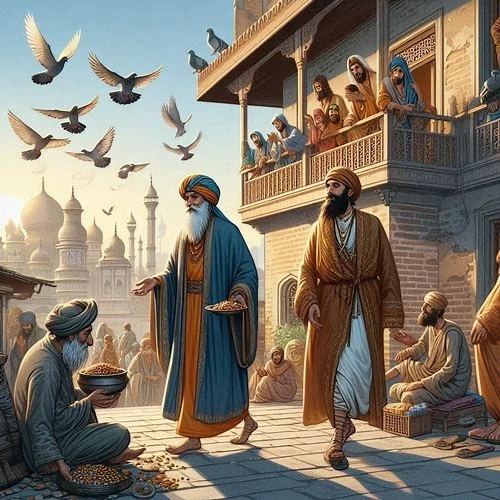A Fakir who begs only in God's name

One day when a king and his minister were taking stroll on the terrace of the king's palace, a Muslim Fakir was crying on the road below, "If God gives, I shall receive."
Hearing the cry, the king told his minister, "I am the king of this land, I provide for everyone. Look at this fakir, instead of taking my name he is begging from God. Does he know who this god is, where he lives? instruct the treasury not to give anything to this man."
After some time, another beggar was passing, who cried, "If the king gives, I shall receive." The king was pleased to hear his praise and instructed his minister to see to it that the beggar be given a golden coin. He further instructed the minister to hide the coin inside a watermelon. The beggar received the watermelon and the hidden coin and praising the king, he departed happily.
At the end of the day, the tired fakir sat under a tree. He was wondering what had gone wrong and was thus addressing God, "Oh my Friend, are you angry with me? I have begged in your name the whole day but I have received nothing. Have I done something wrong or else why are you displeased with me? This has never happened to me before. However even if I have to give up my life, I shall not give up your name, which is far more dear to me than life itself."
At that time, the other beggar, seeing the fakir alone, came to him. Noticing that the visitor was a beggar, the fakir asked him, "To beg, how much did you travel today?"
The other beggar: "Today I did not have to travel much. Soon after I set out, I received this watermelon from the king's palace. What have you received today?"
Fakir: "I have received no alms today, though I have been walking the whole day. Today my friend has given me nothing."
Other beggar: "Look here, how much you may cry in the name of God, nothing will happen. Since we receive help directly from human beings, we have to go to them. Did you go and beg from any human being today?"
Fakir: "I have so long never begged from any human being, because I know that every man, be he a badshah or a fakir, begs from God. So what is the use of begging from a beggar? The one who provides all the basic amenities of life such as water, air and fire without any price- I beg only from him."
Other beggar: You are in delusion. Man's sorrow can only be understood by a man. To mitigate the suffering of human life, men have built roads, ponds, hospitals, etc. God has done nothing. Why should you then not to go to any man for help?"
Fakir: You are shortsighted. Remember, behind all philonthropic work, there is the hand of God. This world is like a huge machinery with many parts and each of the rajas, badshahs and nawabs are like parts of that huge machine. God is the operator and with his inspiration, the rajas and nawabs do all the work."
Other beggar: "See now, the direct proof of what I say. Because you have begged in the name of God, now you have no food to eat and see what I have received. Seeing you hungry, I feel sorry. Take this watermelon. Take the whole fruit, I don't need any part of it because I don't need any part of it because I'm not fond of watermelons."
The beggar gave the watermlon and went away. With tears in his eyes, the fakir thanked God for his kindness. He said "Oh my friend, seeing me hungry, you have sent this fruit through a human being. There is no end to your kindness."
After washing himself and praying, he ate the fruit. Near the end of his meal, he noticed the gold coin, but he could hardly believe his eyes. However, after he was sure, he thanked God a second time: "Oh my friend, you have not only sent me food, but also gold! Instead of showering me a non-believer, with your kindness, if you had given this watermelon and gold to a true devotee, he would have rightly realized your goodness and spread your name."
The moral: If we pay attention, we will realize that God's grace is being showered on us continuously. Everyone receives this grace but only the true devotee takes notice of it.
Source
- Story told by Maharshi Nagendranath Bhaduri, excerpt from the book "One Hundred and Eight Messages from Maharshi Nagendranath"; Story 9, Page # 60, 2012 print